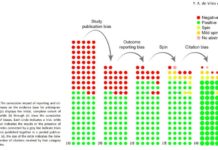Helpful and Harmful Therapist Behaviors, According to Clients
From The British Psychological Society: A recent study has broken new ground by asking clients to provide detailed feedback on a second-by-second basis of their experience of...
What is the Evidence for Empirically Supported Treatments in Psychology?
New meta-scientific review questions the evidence for the gold standard psychotherapies and empirically supported treatments.
Publication Bias Inflates Perceived Efficacy of Depression Treatments, Study Finds
Researchers report the cumulative effects of major biases on the apparent efficacy of antidepressant and psychotherapy treatments.
Early Intervention Can Change the Trajectory of Foster Care Children
Study highlights the importance of early interventions for institutionalized children.
Study Investigates Long-Term Effects of Social and Emotional Learning Programs
Social and Emotional Learning (SEL) programs have gained popularity in U.S. schools in recent years. A new study examines the nature and longevity of their impact on students.
“’Yalom’s Cure’ is a Meditative Immersion into Leading a Psychologist’s Life”
The LA Times reviews a new film about Irvin David Yalom, existential psychologist, emeritus professor of psychiatry at Stanford Unversity. "’Yalom's Cure’ dispenses an...
Hope for Everyone
I am a very optimistic psychologist, but with reason. For 25 years I've been working with people who have had psychological problems in every conceivable area. Many psychologists have problems with burnout, especially early in their careers. For me, this has been very different. By using the treatment techniques that I do, I feel anti-burned out. It is so gratifying to see people get out of their serious problems, that I look forward to every day of clinical work.
Being Bullied by Age Eight Linked to Depression in Adulthood
There is a growing body of evidence suggesting that being exposed to bullying in childhood can contribute to mental health problems later in life. In a new study, published in JAMA Psychiatry, the researchers found that children who reported being bullied at age eight were significantly more likely to seek treatment for mental health problems by age twenty-nine.
Psychotherapy is THE Biological Treatment
Psychotherapy addresses the brain in the way it actually develops, matures and operates. The process for brain change involves deactivation — disuse, not utilizing the old brain map; and then creating a new one. Psychotherapy can deactivate maladaptive brain mappings and foster new and constructive pathways.
Mental Health Recovery Narratives Play Central Role in Trauma-Informed Care
New research synthesizes insights from 45 studies to construct a conceptual framework relating different elements of recovery narratives to trauma-informed approaches to care.
Childhood Adversity Influences Levels of Distress in Voice Hearers
Research finds that hearing negative voices explains how childhood adversity is related to distress.
Critiques of a New Research Study on Antidepressants
A new meta-analysis claiming to prove once and for all that antidepressants are an effective treatment for moderate to severe depression was published just a few days...
Do Psychological Therapies for Schizophrenia and Psychosis Work? – A Debate
-A debate between one of the co-authors of the Understanding Psychosis and Schizophrenia report, and two authors whose meta-analysis of cognitive behavioral therapy was cited in that report.
Study Examines Women’s Experiences of Hearing Voices
An international group of researchers from multiple disciplines has published a historical, qualitative, and quantitative investigation into voice-hearing in women. The interdisciplinary project, freely available from Frontiers in Psychiatry, explores how sexism, exploitation, and oppression bear on women’s’ experiences of hearing voices.
Trauma-Informed Treatment May Lead to Better Outcomes for Psychosis
Researchers at the New York State Psychiatric Institute wondered why a "surprisingly high percentage of study applicants" for studies in PTSD presented with psychotic...
“Mental Illness Mostly Caused by Life Events Not Genetics, Argue Psychologists”
According to psychologists, “mental illness is largely caused by social crises such as unemployment or childhood abuse.” If this is so, why are we...
Drug Treatment for Borderline Personality Disorder Not Supported By Evidence
New research published in the August issue of Psychiatric Annals evaluates the results of randomized control trials on the use of various psychotropic drugs for patients diagnosed with borderline personality disorder (BPD). Despite the “American Psychiatric Association’s practice guidelines endorsement of SSRIs as first-line therapies for BPD,” the results of the meta-analysis reveal that pharmacotherapy in BPD is “not supported by the current literature,” and “should be avoided whenever possible.”
CBT Without Medication is Safe and Effective For Psychosis
A small sample of 20 people with schizophrenia spectrum diagnoses who had refused or discontinued medication were given cognitive therapy by researchers in the...
“Terror Management Theory and our Response to the Paris Attacks”
In this short audio clip, psychologist Sheldon Solomon discusses what research on our unconscious fears about death can tell us about terrorism, intolerance, and radicalism. “In the wake of the Paris attacks, we examine the worm that some people think is eating away at our core — our fear of death.”
Applied Psychoanalytic Theory in School Settings
In this episode of the Psychoanalytic Voices podcast, Dr. William Sharp discusses his work introducing psychoanalytic techniques into school-based settings.
Researchers Make a Case for a “Theory of Nothing” in Psychology
What meaning do psychological constructs really hold, and how are they operationalized and statistically modeled within psychology research?
What Care for the Criminally Insane Can Teach Us
In this piece for The Pew Charitable Trusts, Michael Ollove reports on Oregon's model of intense care and supervision for those found guilty except for insanity.
"Oregon’s model...
Pharmacology Gets More Cooperation Than Psychosocial Advice
In a study of conformance to evidence-based treatment recommendations at mental health clinics among people diagnosed with schizophrenia, Canadian researchers found that conformance to...
Book Review: “Overmedicated and Undertreated”
A former pharma executive has broken ranks with the industry in a new book by reporting how multiple psychiatrists, schools, and his desperate hopes pressed him to allow higher and higher doses of antipsychotic medications. The result: his 15-year-old son's death from Seroquel.
Therapy Recommended As First Line Treatment for Depression
Following an extensive systematic review of treatments for major depression, the American College of Physicians (ACP) issued a recommendation to clinicians suggesting cognitive behavioral therapy (CBT) as a first-line treatment for major depressive disorder along with second-generation antidepressants. The results of the review revealed that CBT and antidepressants have similar levels of effectiveness but that antidepressants present serious side-effects and higher relapse rates.





















